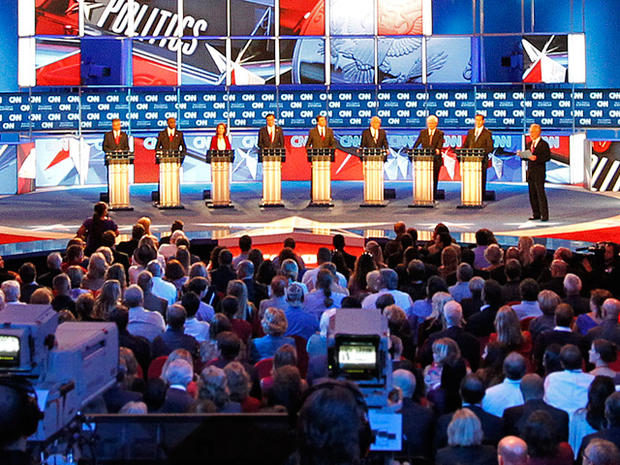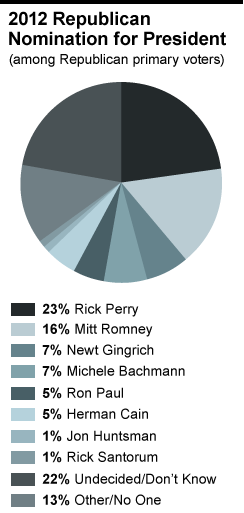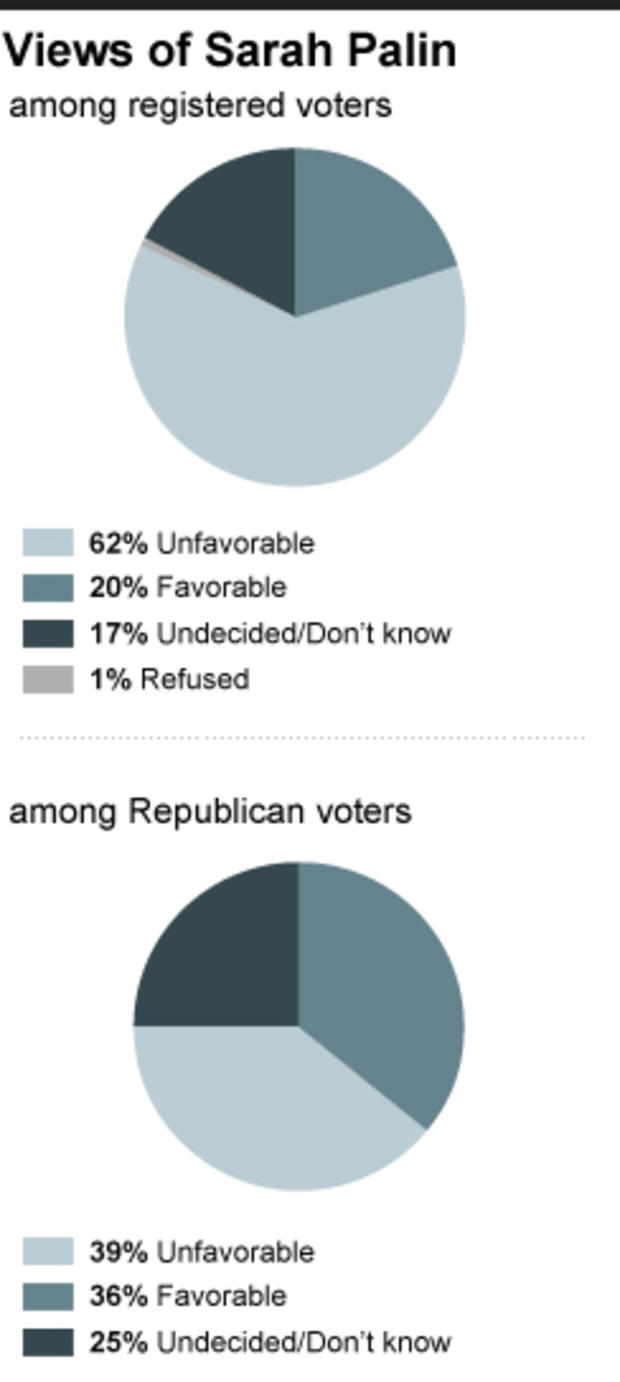Poll: Perry leads pack in Republican presidential race
CBS News Poll analysis by the CBS News Polling Unit: Sarah Dutton, Jennifer De Pinto, Fred Backus and Anthony Salvanto
Just a month after jumping into the race, Texas Gov. Rick Perry already leads a crowded field of Republicans vying for the White House, according to a CBS News/New York Times poll released Friday.
Among voters who intend to vote in a Republican primary or caucus, Perry leads the pack of candidates nationally with 23 percent, with former Massachusetts Gov. Mitt Romney at 16 percent. Former House Speaker Newt Gingrich and Minnesota Rep. Michele Bachmann tie for third with 7 percent, followed by Texas Rep. Ron Paul (5 percent) and business executive Herman Cain (5 percent). Former Ambassador and Utah Gov. Jon Huntsman and former Sen. Rick Santorum each receive 1 percent.
However, with months to go before the start of the primaries and caucuses, about one in five Republican primary voters is undecided on a candidate at this point. That is about twice as many compared to four years ago.
About one in ten said they would choose someone else, with three percent volunteering former Alaska Gov. Sarah Palin, who has not yet publicly said whether she will even run.
For comparison, at a similar stage in the campaign in 2007, former New York City Mayor Rudy Giuliani was the leading choice of Republican primary voters (at 34 percent), followed by former Tennessee Sen. Fred Thompson (23 percent). The eventual nominee, Arizona Sen. John McCain, was in third place with 16 percent, according to a CBS News poll. Romney, who is undertaking his second bid for the GOP nomination, received the support of 9 percent in that poll.
In the poll, half of primary voters who pick a candidate for the nomination say they like their candidate but have reservations about him or her. As for the two leading candidate, six in 10 Perry and Romney supporters say they have reservations about their candidate. And Romney's support is somewhat weaker than Perry's - just 25 percent of Romney's supporters strongly favor him, compared to 33 percent of Perry's.
Among the two leaders, Perry leads Romney and the rest of the Republican field among many demographic groups. He leads Romney among both men and women, but has a larger lead with men. He gets the support of 28 percent of evangelicals who plan to vote in a Republican primary or caucus, compared to just 10 percent for Romney. The race is tighter among non-evangelicals.
Forty-nine percent of Republican primary voters support the Tea Party movement, and they back Perry over Romney by nearly three to one. However, Romney has an advantage among non-Tea Party primary voters. Romney does better with moderates, but Perry is stronger among conservatives - and more than two-thirds of Republican primary voters identify themselves as conservatives.
Those who would like to see Social Security privatized (more than six in 10 Republican primary voters) back Perry, while the race is close among those Republicans who think privatizing Social Security is a bad idea.
There is a desire for more candidate choices among some Republicans, but it is not unusual for voters to want more choices. Even though 43 percent of Republican primary voters are satisfied with the field of presidential candidates, more - 50 percent - would like other choices. This level of satisfaction among Republicans is similar to what it was in the fall of 2007.
Views of the candidates:
As it is still early in the campaign, many of the Republican candidates for president remain unknown to voters nationwide -- even to many Republicans.
Romney and Perry have the highest positive ratings among Republican primary voters - each is viewed favorably by over four in 10 primary voters. Republicans give Romney higher unfavorable ratings than Perry, but Perry is less well-known.
Paul and former Ambassador Jon Huntsman are the only candidates viewed more negatively than positively among Republican primary voters, but seven in 10 don't yet have an opinion of Huntsman, and nearly half are undecided about Paul.
Republican primary voters who support the Tea Party movement (49 percent of them do) view Perry most positively (59 percent). They also hold especially favorable opinions of Bachmann, who chairs the House Tea Party caucus, as well as Gingrich. Paul is viewed more negatively than positively by Tea Partiers who plan to vote in a Republican primary.
Opinions of the candidates among all registered voters are more negative - no candidate enjoys a net positive rating among this broader group. And many registered voters overall have not yet formed an opinion of these candidates.
Sarah Palin:
Palin's negative ratings have been on the rise since she left her job as governor of Alaska in 2009. Sixty-two percent of voters now say they hold an unfavorable view of the 2008 Republican vice presidential nominee -- the highest since 2008 when CBS News began asking about her. Only 20 percent view her favorably.
For the first time in CBS News polls, more Republicans now view Palin unfavorably (39 percent) than favorably (36 percent). Opinions are similar among Republican primary voters. Just after her convention speech in 2008, three in four Republicans viewed her favorably.
Palin's favorability among those who support the Tea Party movement has dropped a bit as well to 44 percent, but more still view her positively than negatively (32 percent).
As for Palin's political future, 71 percent of voters nationwide say they would not like to see her become a major national political figure for many years to come. Most Democrats and independents would not like to see this happen, as do almost half of Republicans. Tea Partiers are more likely to want Palin to remain in the political spotlight.
What Republicans want
Looking ahead, Republican primary voters are split on whether they prefer a nominee who agrees with their positions on issues or one with the best chance of defeating President Obama in 2012 - with 48 percent in each side in the poll.
While Perry, who has spent most of his career in politics, leads the Republican field nationally in this poll, 48 percent of Republican primary voters say they prefer a nominee whose experience has mostly been in the business or private sector, while fewer - 14 percent - want someone with a mostly political background. A third says it doesn't matter.
More than half of Republican primary voters say it is important that a presidential candidate share their religious beliefs. This is also important to four in 10 registered voters overall. Among white evangelicals (six in 10 of whom plan to vote in a Republican primary), 81 percent say it is important that a candidate have the same religious beliefs as they do, including half who say it is very important.
The field of Republican candidates includes a woman and two Mormon candidates. Forty-five percent of Republican primary voters say most people they know would support a candidate who is Mormon for president (without mentioning a candidate by name), but 36 percent say most people they know would not.
There is more support for a hypothetical woman candidate, with almost seven in ten of all voters and Republican primary voters saying most people they know would support a woman candidate.
On the issues:
In the Republican nomination contest, a variety of issues are being debated: Social Security, Medicare, global warming, health care and immigration among them. The poll compared the views on these issues between Republicans and Americans overall, finding some similarities and some important differences.
- Republicans - including Tea Party Republicans - voice widespread agreement that Social Security and Medicare programs are worth the costs. It's a view widely shared by all Americans.
- The idea of reducing benefits in Social Security doesn't find much favor among Republicans (only one-third would support that), or among the overall population.
- Half of Republicans have doubts the Social Security program will be there for them when they retire. This view is especially prevalent among younger Republicans. Half of all Americans share that sentiment, too.
- Republicans are more likely to say privatized Social Security accounts are a good idea. Two-thirds like that idea, while Americans generally are split. Tea Party Republicans especially like the idea.
- Compared to Americans overall, Republicans are far less likely to believe that global warming is caused by human activity (about half as many think so) - and are more likely to doubt it exists at all. Tea Party Republicans are particularly doubtful.
- At nearly twice the rate as all Americans, Republicans say the new health care law ought to be repealed in whole or in part. And Tea Party Republicans overwhelmingly want full repeal.
- Republicans are more likely to say illegal immigrants should be deported - half do - while four in ten Americans agree. Republicans are less like to support a citizenship process for them.
- Most Americans favor capital punishment in at least some instances, but Republicans favor it in greater numbers than the public overall (eight in ten compared to six in ten.)
- As has been the case for some time, Republicans voice more opposition to the idea of same sex marriage, and to abortion.
The enthusiasm gap
Looking ahead to the general election, 31 percent of registered voters nationwide say they are more enthusiastic about the 2012 presidential election compared to past elections (18 percent are less enthusiastic and 50 percent say they have the same level of enthusiasm). This level of enthusiasm is similar to what it was in the fall of 2007.
But there is an 18 point partisan enthusiasm gap that currently favors Republicans: 44 percent of Republican voters are more enthusiastic about voting in 2012, while just 26 percent of Democrats are. This is a reversal compared to October, 2007, when twice as many Democrats as Republicans expressed more enthusiasm about voting.
Republicans are also more likely than Democrats to be tuned into the 2012 campaign - 77 percent of Republicans are paying at least some attention (including more than a third who are paying a lot of attention), compared to 61 percent of Democrats. But it's still early in the campaign cycle, and only 30 percent of voters overall are paying a lot of attention to the 2012 election campaign so far.
More from the CBS News/NYT poll:
Most think U.S. on wrong track as fears about economy grow
Obama's approval rating drops to all-time low; Public split on jobs plan
Just 12% happy with Congress
Read the complete poll (PDF)
This poll was conducted among a random sample of 1,452 adults nationwide, interviewed by telephone September 10-15, 2011. The error due to sampling for results based on the entire sample could be plus or minus three percentage points. The error for subgroups is higher. An oversample of Republicans was also conducted for this poll, for a total of 781 interviews among this group. The results were then weighted in proportion to the average party distributions in previous 2011 CBS News and CBS News/New York Times Polls and in the random sample in this poll. The margin of error for Republicans is plus or minus four percentage points.


